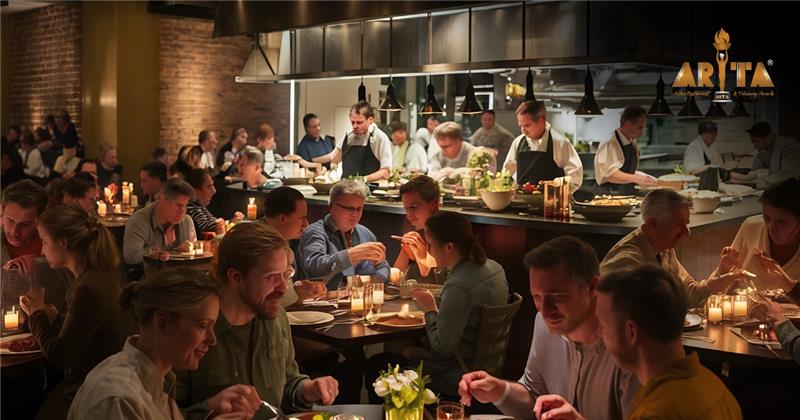Are you a restaurant owner wondering what it takes to win a restaurant award? You may be running a cosy, family-run restaurant in East London or a busy Indian takeaway in Birmingham, but you must have surely heard of the Asian Restaurant and Takeaway Awards, which is known as the Curry Oscars. Don’t treat them as just a trophy for your wall. They’re a real mark of trust. Customers notice them. The local community feels proud. And it can open doors you didn’t even know existed.
But what are the judges actually looking for when they visit your restaurant? What makes them tick a box—or cross one out?
It’s Not Just About Great Food (Though That Still Matters)
You need to have great food. Award judges are looking for flavour, as well as quality and consistency. However, the truth is that restaurant awards are not only about taste.
At events like the ARTA, judges will focus on the whole experience. They will pay attention to everything, from your front-of-house team and kitchen setup to how customers are being served and the overall cleanliness of your restaurant.
Even though you serve the best biryani in town, your chances of winning the award will be affected if your service feels rushed or your restaurant appears tired.
Hospitality Is Your Secret Weapon
One thing judges always notice? How you make people feel.
Indian restaurants in the UK are known for warm, welcoming hospitality—that feeling of being looked after, like you’re a guest in someone’s home. That counts for a lot. From the moment a customer walks in to the way their food is served, every small detail adds up.
It’s not about being fancy. You don’t need silver cutlery or jazz music. What you need is heart. A genuine smile. A team that knows the menu and treats customers with respect and attention.
Judges see straight through robotic service. They want to feel that you actually care. And when you do, it shows.
Consistency Is What Separates the Good from the Great
Anyone can have a great night. But can you deliver the same standard every night?
That’s the big question.
Many judges don’t announce when they’re coming. They might just walk in and order a chicken tikka and a mango lassi like any other customer. They’re looking at whether the experience is always good, not just when you’re expecting someone important.
Restaurants that do well in Curry Oscars and other food industry awards usually have strong systems behind the scenes. The staff know their roles. The kitchen flows like clockwork. The food tastes the same whether it’s a Tuesday lunch or a Friday night rush.
Your Story Matters More Than You Think
Judges aren’t just looking at your food and service—they’re listening for your story.
Is your restaurant a family business? Were the recipes passed down from your grandfather in Punjab? Did you start in a small unit and grow it through pure passion and hard work?
That story is part of your identity. It makes your restaurant unique. And when judges hear it, it helps them connect with you on a deeper level.
So when you’re nominated for something like the Asian Restaurant and Takeaway Awards, don’t just send a bland form. Share who you are. Let them know why you do what you do. That authenticity goes a long way.
The Power of Local Support
In many of these awards, such as the ARTAs, a public vote is involved. And that’s where your regular customers come in.
People love to back their favourite local spot. If your customers know you’re up for a restaurant award, they’ll often jump in to support you. But that only happens if you’ve built a good relationship with your community.
You don’t need to host big events or spend a lot on marketing. Even small things—supporting a school raffle, giving NHS workers a discount, remembering a regular’s favourite order—build goodwill over time.
That goodwill turns into votes. And votes can take you straight to the finals.
Online Presence Isn’t Just for the Big Chains
Let’s be honest—these days, the first place people go to check out a restaurant is Google. Or Instagram. Or ChefOnline.
If your menu is hard to find online, your pictures are blurry, or your reviews go unanswered, it sends the wrong message.
Even the Curry Oscars judges do online research before visiting shortlisted restaurants. They want to see that you’re proud of your food, that customers are talking about you, and that you’re actively part of the local food scene.
So don’t ignore your digital side. Keep your menu updated. Reply to reviews. Post photos of your food on social media—even if it’s just one or two a week. It makes a difference.
What Judges See in a Top Indian Restaurant
You might think judges are only focused on Michelin-level stuff. But actually, they’re looking for something much simpler: a restaurant that knows what it’s doing, stays true to its roots, and makes people happy.
If your food is tasty, your service is warm, your kitchen is clean, and your team is proud of what they do, you’re already halfway there.
Final Word: It’s About Passion, Not Perfection
Winning a restaurant award isn’t about being perfect. It’s about showing genuine passion and care, day in and day out.
The judges behind the Asian Restaurant and Takeaway Awards aren’t looking for the flashiest restaurant. They’re looking for the most deserving one. The restaurant that loves its food. Loves its customers. Works hard to maintain high standards.
So if you’re aiming for a trophy this year, don’t change who you are. Just double down on what you do best. Keep your food honest. Keep your service sincere. And tell your story with pride.
You’ve already got the ingredients. Now it’s time to let them shine.
FAQs: What Judges Look for in Restaurant Award Competitions
- Do I need a fancy restaurant to win an award?
Not at all. Many winners are small, family-run takeaways or casual dining spots. It’s about heart, quality, and consistency—not chandeliers. - Do online reviews really matter?
Yes, more than ever. Judges often check your Google reviews before visiting. Positive feedback and engagement go a long way.
3. How can I prepare my team for an award visit?
Focus on good training and consistent service every day. If your team knows what excellence looks like, you won’t need to “prepare”—you’ll already be ready.





